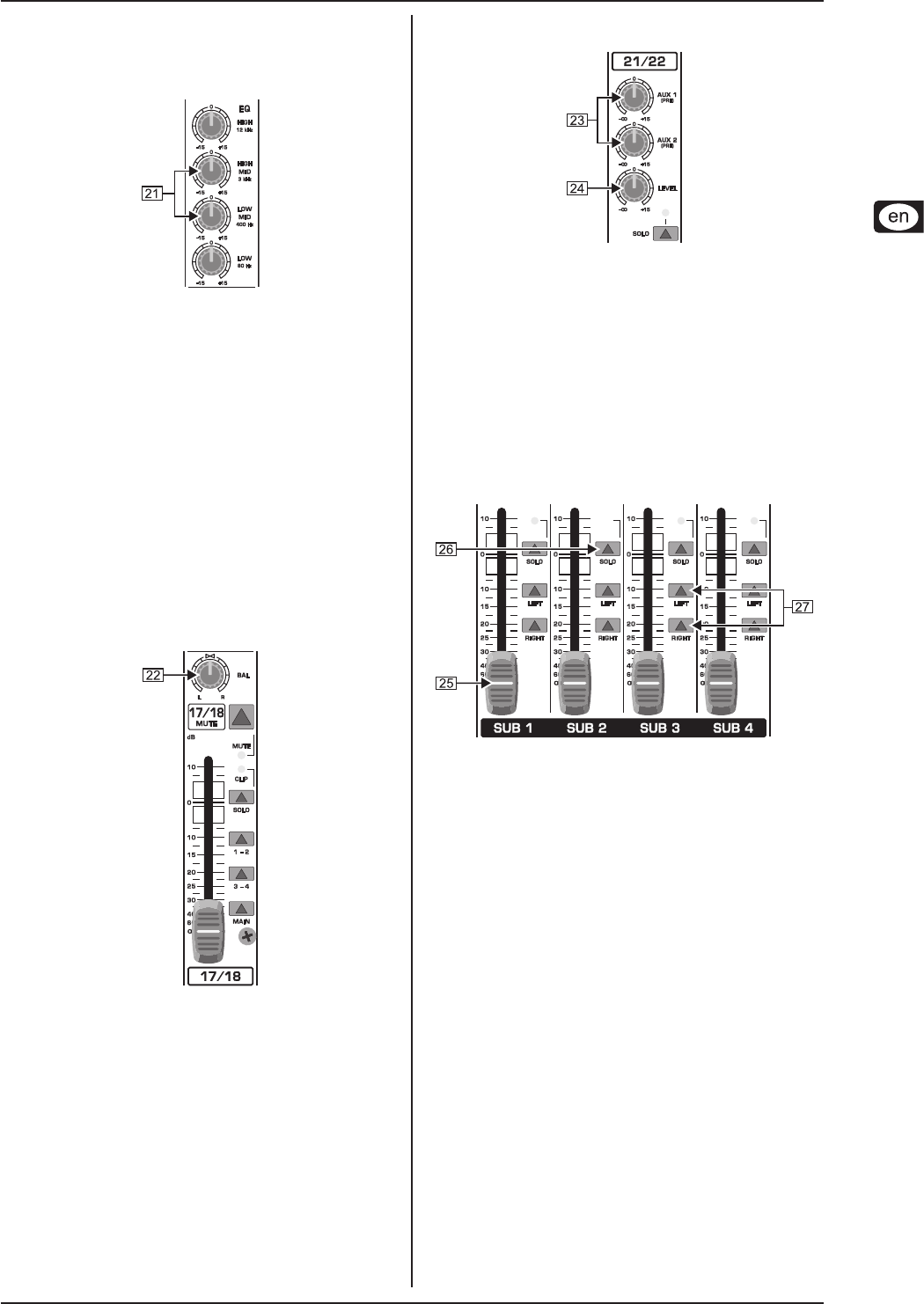
EURODESK SX3242FX/SX2442FX
Control elements and connections 7
(20) All stereo channel strips have a TRIM control for gain adjust-
ment. Its scale ranges from +20 to -20 dB and allows you to
adapt the input level to the line inputs.
Stereo channel equalizer2.2.2
Stereo channel equalizerFig. 2.6:
The stereo channels are equipped with a stereo equalizer. The
lter types and cutoff frequencies for HIGH and LOW lters are
the same as on the mono channels. Instead of one semi-paramtric
midrange band, the stereo channels have two separate midrange
bands ((21) HIGH MID and LOW MID) with xed mid-frequencies
(3 kHz and 400 Hz). Stereo EQs are preferable for processing the
frequency response of stereo signals. With two mono equalizers
you might encounter problems with different settings between the
left and right channels.
Stereo channel aux/FX send buses2.2.3
Basically, the aux and FX buses on the stereo channels are the
same as on the mono channels. Since aux buses are always mono,
the signal from a stereo channel is rst mixed to mono before it
is routed to the aux bus.
Stereo channel fader and 2.2.4
other control elements
Channel fader, balance control, mute switch, etc.Fig. 2.7:
(22) The BAL(ANCE) control has the same function as the PAN
control on the mono channels. It determines the relative
volume of the left and right input signals before they are
routed to the stereo main mix bus (or to two subgroups).
All other control elements of the stereo channels work in the same
ways as their counterparts on the mono channels (faders, MUTE
switches, etc.).
Please note: When you route a stereo channel to the +
subgroups using the SUB switches, please be sure to
set the BAL control to its mid position, so that the signal
is sent to two subgroups and remains stereo.
Stereo channels 21 - 24 (SX2442FX) 2.3
or 29 - 32 (SX3242FX)
Auxiliary stereo channelsFig. 2.8:
Your EURODESK has two stereo channels with an aux send
section ((23) AUX 1 and AUX 2) and one LEVEL control (24). For
these channels, the aux buses are hard-wired to pre-fader and are
therefore particularly useful for monitoring. They have no routing
switches and are always sent to the main mix. Like the normal
stereo channels they have two line-level inputs on1/4" TRS con-
nectors for the left and right channels, and a SOLO switch.
Similar to the CD/TAPE inputs (see (49)) the auxiliary stereo
channels can be connected to CD players, tape decks, etc., for
example, to feed in playback material.
Subgroups 1 - 42.4
Subgroups 1 - 4Fig. 2.9:
The EURODESK has 4 subgroups enabling you to create mono or
stereo mixes from multiple input signals. Subgroups are controlled
from one (mono) or two (stereo) subgroup faders. Additionally, it
is possible to connect the subgroup outputs as tape sends to a
multi-track recorder.
(25) The subgroup faders determine the volume of the subgroup
signal at the subgroup output (28). Depending on the position
of the routing switch (27) you can thus control the subgroup
volume in the main mix.
(26) The SOLO switch routes the subgroup signal to the solo
bus (Solo In Place) or PFL bus (Pre Fader Listen), so that
you can monitor the subgroup signal without affecting the
main or sub output signals. The signal to be monitored is
taken either pre (PFL, mono) or post-subgroup fader(Solo,
stereo), depending on the position of theSOLO/PFL switch
(40)). The SOLO LED illuminates when the SOLO switch is
pressed.
(27) Use the routing switches for the subgroups to send the
subgroup signal to the main mix. You can route it to the
left stereo side (=LEFT pressed), to the right stereo side
(=RIGHT pressed) or to both (=LEFT and RIGHT pressed).
For example, when you have created a stereo submix using
subgroups 1 and 2, be sure to route group 1 to the left and
group 2 to the right side to maintain proper stereo position-
ing. If it is a mono submix with just one subgroup, route it to
the left and right sides of the main mix to make the signal
audible on both sides.


















